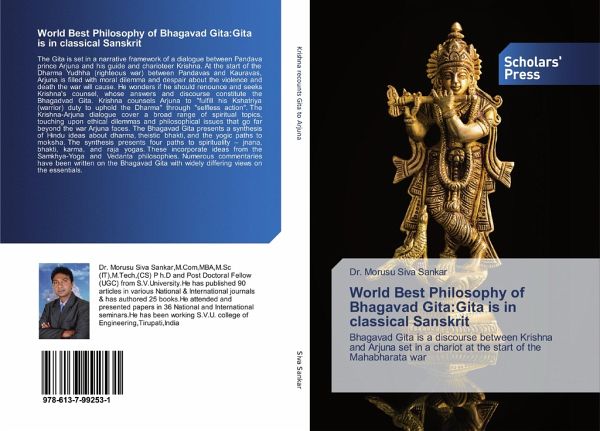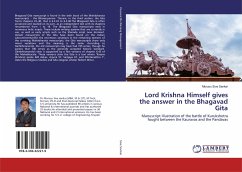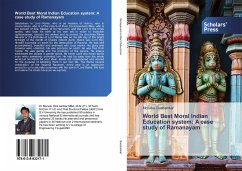
World Best Philosophy of Bhagavad Gita:Gita is in classical Sanskrit
Bhagavad Gita is a discourse between Krishna and Arjuna set in a chariot at the start of the Mahabharata war
Versandkostenfrei!
Versandfertig in 6-10 Tagen
53,99 €
inkl. MwSt.

PAYBACK Punkte
27 °P sammeln!
The Gita is set in a narrative framework of a dialogue between Pandava prince Arjuna and his guide and charioteer Krishna. At the start of the Dharma Yudhha (righteous war) between Pandavas and Kauravas, Arjuna is filled with moral dilemma and despair about the violence and death the war will cause. He wonders if he should renounce and seeks Krishna's counsel, whose answers and discourse constitute the Bhagadvad Gita. Krishna counsels Arjuna to "fulfill his Kshatriya (warrior) duty to uphold the Dharma" through "selfless action". The Krishna-Arjuna dialogue cover a broad range of spiritual top...
The Gita is set in a narrative framework of a dialogue between Pandava prince Arjuna and his guide and charioteer Krishna. At the start of the Dharma Yudhha (righteous war) between Pandavas and Kauravas, Arjuna is filled with moral dilemma and despair about the violence and death the war will cause. He wonders if he should renounce and seeks Krishna's counsel, whose answers and discourse constitute the Bhagadvad Gita. Krishna counsels Arjuna to "fulfill his Kshatriya (warrior) duty to uphold the Dharma" through "selfless action". The Krishna-Arjuna dialogue cover a broad range of spiritual topics, touching upon ethical dilemmas and philosophical issues that go far beyond the war Arjuna faces. The Bhagavad Gita presents a synthesis of Hindu ideas about dharma, theistic bhakti, and the yogic paths to moksha. The synthesis presents four paths to spirituality - jnana, bhakti, karma, and raja yogas. These incorporate ideas from the Samkhya-Yoga and Vedanta philosophies. Numerous commentaries have been written on the Bhagavad Gita with widely differing views on the essentials.












